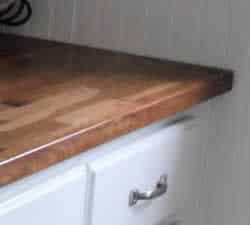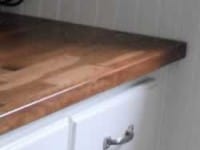 Butcherblock countertops and other wood countertops remain a popular choice in kitchens especially, though some woods are used in bathroom countertops too. Butcher block counters are excellent for food preparation and are sometimes used in the kitchen in conjunction with other surfaces such as quartz, granite and laminate. For example, a work island might have a butcherblock countertop while the tops around the and appliances sink are made from another material. When considering butcherblock many environment conscious buyers will look at green or eco-friendly countertops like reclaimed wood
Butcherblock countertops and other wood countertops remain a popular choice in kitchens especially, though some woods are used in bathroom countertops too. Butcher block counters are excellent for food preparation and are sometimes used in the kitchen in conjunction with other surfaces such as quartz, granite and laminate. For example, a work island might have a butcherblock countertop while the tops around the and appliances sink are made from another material. When considering butcherblock many environment conscious buyers will look at green or eco-friendly countertops like reclaimed wood
What are Wood or Butcherblock Countertops?
Wood of all types is warm and inviting when used in a kitchen or bathroom. Butcher block countertops are crafted from wood pieces of differing colors, brought together to form a complementary and attractive pattern. The wood is glued together, sanded and sealed to form a smooth, unified countertop. Because of the wide variety of wood materials used, the cost of different countertops varies too, from $35-$200 per square foot.

Strengths and Weaknesses
Strengths: The warmth and beauty of natural wood is very inviting for homeowners and their guests. Butcher block countertops are ideal for those who enjoy baking and other types of food preparation. They handle cutting very well and do a good job of hiding cuts and scratches. In fact, their usefulness and the scars they accumulate give them character and are part of their appeal. After years of use, these bathroom and kitchen countertops can be sanded and resealed, making them look new again. Wood and butcherblock goes well with a wide variety of cabinetry, flooring and other kitchen décor. The bath and kitchen countertops are easy to clean and they don’t suffer from some of the weaknesses of harder countertops such as cracking or chipping.
Weaknesses: Butcherblock countertops need to be sealed when produced or first installed and they require periodic sealing over the years. Without sealing, water can penetrate the butcher block and warp wood pieces, causing them to separate. Unsealed wood can also harbor germs. Long-term exposure to water is not good for the wood so clean up water and wipe butcher block and wood countertops dry after cleaning them. If the surface is scratched below the level of the finish, oiling the area is needed. In fact, some manufacturers recommend oiling butcher block countertops every 1-3 months with linseed oil to keep out the harmful effects of water.
Who Should Consider Butcherblock Countertops?
If you enjoy working in the kitchen, you’ll probably love the functionality of butcher block countertops and other wood countertops. They are great for baking and other types of food preparation. If you are crafting a warm, traditional look in the kitchen or bathroom, wood and butcher block will also prove an asset to your decorating.
